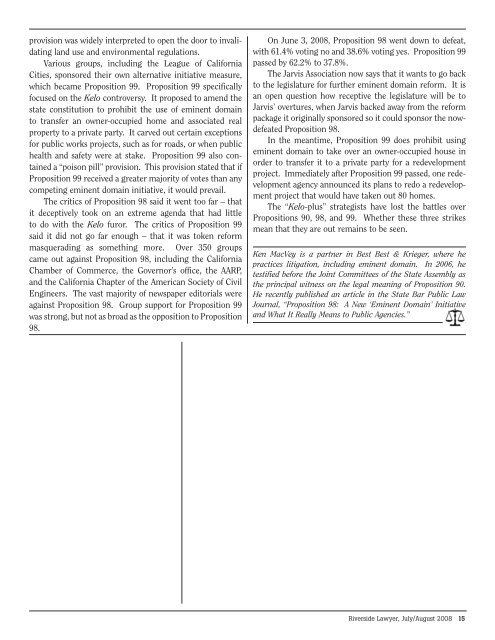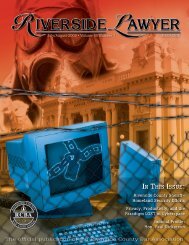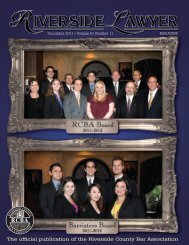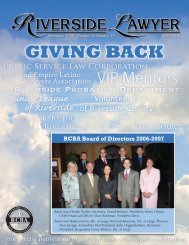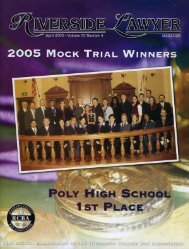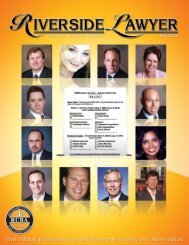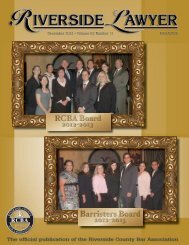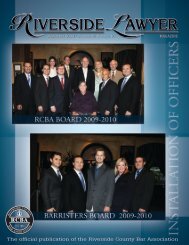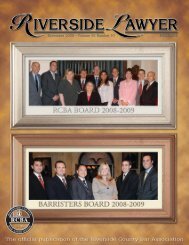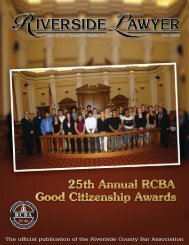IN THIS ISSUE: - Riverside County Bar Association
IN THIS ISSUE: - Riverside County Bar Association
IN THIS ISSUE: - Riverside County Bar Association
You also want an ePaper? Increase the reach of your titles
YUMPU automatically turns print PDFs into web optimized ePapers that Google loves.
provision was widely interpreted to open the door to invalidating<br />
land use and environmental regulations.<br />
Various groups, including the League of California<br />
Cities, sponsored their own alternative initiative measure,<br />
which became Proposition 99. Proposition 99 specifically<br />
focused on the Kelo controversy. It proposed to amend the<br />
state constitution to prohibit the use of eminent domain<br />
to transfer an owner-occupied home and associated real<br />
property to a private party. It carved out certain exceptions<br />
for public works projects, such as for roads, or when public<br />
health and safety were at stake. Proposition 99 also contained<br />
a “poison pill” provision. This provision stated that if<br />
Proposition 99 received a greater majority of votes than any<br />
competing eminent domain initiative, it would prevail.<br />
The critics of Proposition 98 said it went too far – that<br />
it deceptively took on an extreme agenda that had little<br />
to do with the Kelo furor. The critics of Proposition 99<br />
said it did not go far enough – that it was token reform<br />
masquerading as something more. Over 350 groups<br />
came out against Proposition 98, including the California<br />
Chamber of Commerce, the Governor’s office, the AARP,<br />
and the California Chapter of the American Society of Civil<br />
Engineers. The vast majority of newspaper editorials were<br />
against Proposition 98. Group support for Proposition 99<br />
was strong, but not as broad as the opposition to Proposition<br />
98.<br />
On June 3, 2008, Proposition 98 went down to defeat,<br />
with 61.4% voting no and 38.6% voting yes. Proposition 99<br />
passed by 62.2% to 37.8%.<br />
The Jarvis <strong>Association</strong> now says that it wants to go back<br />
to the legislature for further eminent domain reform. It is<br />
an open question how receptive the legislature will be to<br />
Jarvis’ overtures, when Jarvis backed away from the reform<br />
package it originally sponsored so it could sponsor the nowdefeated<br />
Proposition 98.<br />
In the meantime, Proposition 99 does prohibit using<br />
eminent domain to take over an owner-occupied house in<br />
order to transfer it to a private party for a redevelopment<br />
project. Immediately after Proposition 99 passed, one redevelopment<br />
agency announced its plans to redo a redevelopment<br />
project that would have taken out 80 homes.<br />
The “Kelo-plus” strategists have lost the battles over<br />
Propositions 90, 98, and 99. Whether these three strikes<br />
mean that they are out remains to be seen.<br />
Ken MacVey is a partner in Best Best & Krieger, where he<br />
practices litigation, including eminent domain. In 2006, he<br />
testified before the Joint Committees of the State Assembly as<br />
the principal witness on the legal meaning of Proposition 90.<br />
He recently published an article in the State <strong>Bar</strong> Public Law<br />
Journal, “Proposition 98: A New ‘Eminent Domain’ Initiative<br />
and What It Really Means to Public Agencies.”<br />
<strong>Riverside</strong> Lawyer, July/August 2008 15


